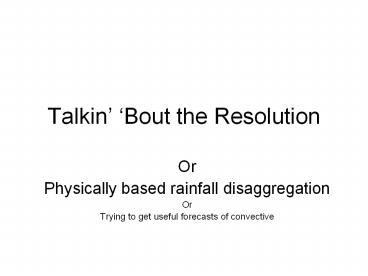Talkin Bout the Resolution - PowerPoint PPT Presentation
1 / 19
Title:
Talkin Bout the Resolution
Description:
Statement of the problem. Long, roundabout approach to solving the problem, using ... Need help from orography. Need to get money to investigate! Into the future ... – PowerPoint PPT presentation
Number of Views:88
Avg rating:3.0/5.0
Title: Talkin Bout the Resolution
1
Talkin Bout the Resolution
- Or
- Physically based rainfall disaggregation
- Or
- Trying to get useful forecasts of convective
2
What Im Gonna Tell You About
- Statement of the problem
- Long, roundabout approach to solving the problem,
using - Remote Sensing
- Simple (very) convective model
- Some results
- Everything I neglected to mention
3
THE PROBLEMNWP Model Convective Rainfall
Forecast Fields
- Color Scale
1-2mm
100 km
Rainfall
100km
4
Surface heating and rainfall
Thunderstorm tracks 22/07/96
Fox and Collier (2000)
5
Two ways to go
- We can throw away NWP model data
- This means doing our own thing
- We need to know something about water vapor
availability - We can keep the NWP output
- This means we develop a dimensionless
disaggregation parameter - We use all that lovely water budget information
wrapped up in the model
6
Both ways are based on
- Simple estimation of convective rainfall rate
from
R Rainfall rate ? Density of air ?s
saturated mixing ratio W vertical velocity
7
ALL ARE MEASURED AT AN ALTITUDE OF Z
- Z is the height of the cloud base
- We assume this is the top of the atmospheric
boundary layer (potential temperature step) - We can find Z from a simple convective model if
we know the surface sensible heat flux
8
Finding wZ
- wZ can be found from the sensible heat flux and
the surface temperature
9
Assuming adiabatic parcel ascent within a
boundary layer of constant potential temperature
Tz - Parcel temperature Te environment
temperature Ta surface air temperature
10
We need from remote sensing the following
- Surface temperature
- Sensible heat flux
- Depends on evapotranspiration and NDVI
- NDVI
- Evapotranspiration
- Found from change in soil moisture content
11
Remote sensing
- From AVHRR
- Surface temperature
- NDVI
- From SAR (well, sort of)
- Soil moisture
- Analysis in ERDAS Imagine
12
Features of the SHF field
- Lots of SH
- In urban areas
- High absorption of solar radiation
- Little evapotranspiration
- Not much SH
- Upland forested moors
- Lots of evapotranspiration
13
Neils theory of organized vegetation
- If vegetation is arranged in an organized pattern
and the wind blows in the right direction then - One can enhance local circulations (NCMC
Non-classical mesoscale circulations) - One can change rainfall patterns
- Need to get the right wavelength
- Need help from orography
- Need to get money to investigate!
14
Into the future
- If we can predict the required fields for a few
days ahead we can make forecasts - Net radiation
- We know solar elevation etc
- We have measured albedo
- NDVI is not going to change much
- SMC we model using a 1/day1/2 relationship
- IT ALL FALLS APART IF IT RAINS!
15
Case study
- NW England
- Manchester
- Mersey Basin
- West Pennine Moors
- July 1996
16
If we ignore NWP output
- We need knowledge of water vapor availability
- We can get this from remote sensing also BUT
- We cannot forecast forward on time
- Unless we use some form of frequency distribution
of precipitable water to produce a probability of
certain rainfall and stream flow
17
On the other hand
- If we assume that the model is pretty good at
gross water balance and that the average
convective fall over the grid square is accurate
THEN - We need a normalized parameter to distribute
(disaggregate or downscale) the NM rainfall
18
CDP Convective Disaggregation Parameter (f)
Mean f
Normalized f
19
Disaggregated square convective rainfall































